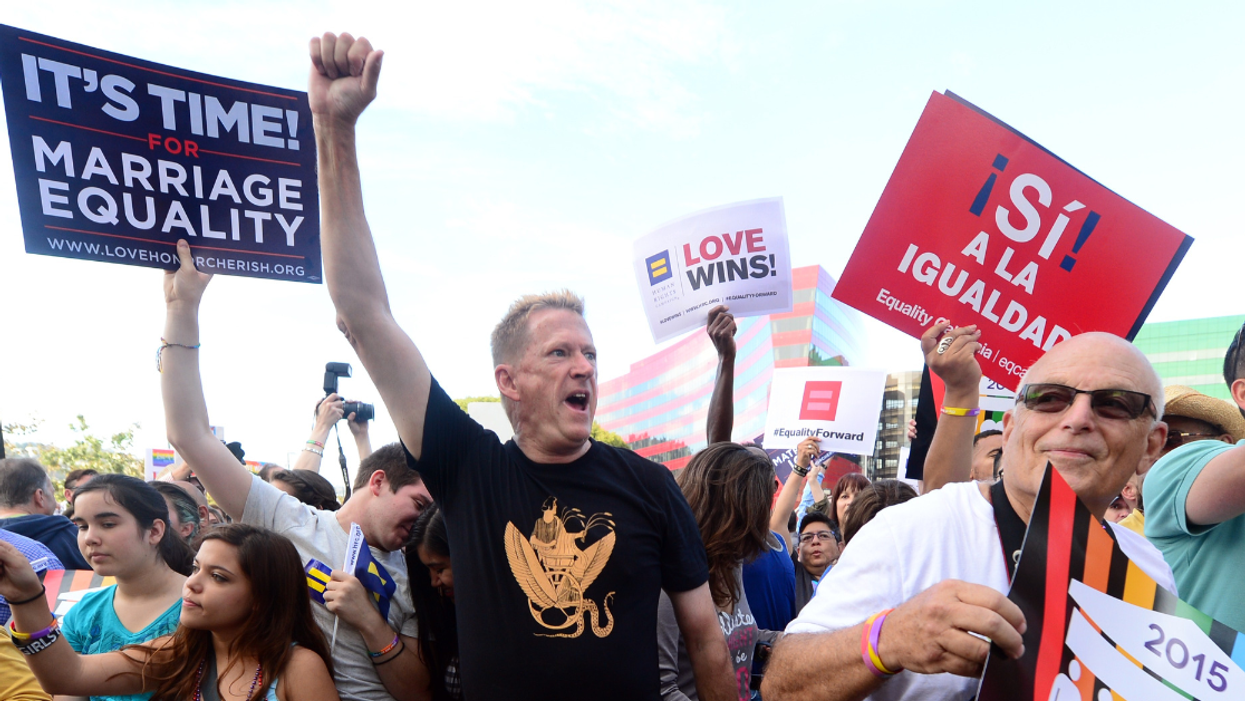Yesterday, the LGBTQ+ community and its allies watched anxiously as the votes in the Senate were counted.
On the table was a motion for “cloture”—meaning a vote to overcome a Senate filibuster—on the Respect for Marriage Act (RFMA). Supporters needed more than 60 votes total to end debate and move the bill forward, so with 50 Democrats in support, they needed at least 10 Republicans.
By the end they had 12, making the vote to end debate 62 to 37 with one senator absent.
The chamber is now widely expected to pass the bill by at least the same margin after Thanksgiving, sending it to back the House where it has already passed in one form but needs to be cleared once more, very likely prospect given the margin it passed by before.
It will then head to President Biden’s desk to be signed into law before the end of this Congressional session.
There have been many breathless headlines and bad takes on social media that announced that the RFMA protected same-sex marriages and codified the Supreme Court’s landmark ruling in Obergefell, but this gets it a bit wrong.
So it’s worth being precise in our understanding of what the RFMA does and does not do. Let’s first look at what the impetus for the bill was, take a 30,000 foot survey of the legal landscape and history of marriage equality in the U.S., and then explain how the RFMA fits into all of that.
The Justice Thomas Bombshell
When the Supreme Court in its infamous Dobbs decision overturned Roe v. Wade, that blow apparently wasn’t enough for Justice Clarence Thomas. In his concurring opinion, he also took a swipe at a long line of related cases and invited challenges to them.
He knew that those rulings were all based upon a fundamental right to privacy that the Court had just obliterated. They included the right to contraception, the right to marry the person you love, and the right to intimate sexual relationships with other consenting adults.
This invitation called into question not only the right to same-sex marriage in Obergefell but even the right to interracial marriage set out in Loving v. Virginia back in the 1960s. It is deeply ironic that by this concurring opinion, Thomas was putting at risk the very rights that protected his own marriage.
Civil rights activists and their allies in Congress responded by proposing the RFMA, which would repeal the so-called Defense of Marriage Act. So to understand where RFMA will leave us after its expected passage, we have to rewind to the 1990s.
The Birth of Marriage Equality and the Horrifying Defense of Marriage Act
In 1993, the state supreme court of Hawaii ruled that the state would need to show a “compelling state interest” to deny same-sex marriage in the state. That’s legal code for something known as “strict scrutiny”—usually a nearly impossible bar set by the courts for the state to meet.
Not-so-fun fact: The Supreme Court actually once found there was a “pressing public necessity” to intern 120,000 Japanese Americans during World War II in its universally criticized Korematsu case.
The same-sex marriage ruling in Hawaii set off panic back in the continental U.S. among conservatives because of a clause in the Constitution that requires states to grant “full faith and credit” to the laws of other states. That clause is why you can get a marriage (or a divorce) in Nevada, and all the other states have to recognize it as valid even if you said your vows at a drive-through chapel.
The Hawaii ruling also panicked conservative federal lawmakers, who worried that it might mean same-sex couples were entitled to a host of federal benefits from marriage (gasp!). These included tax filing benefits, Social Security survivor benefits, and the ability to sponsor a spouse for citizenship.
Indeed, at the time there were over 1,000 codified federal rights and benefits that married couples were entitled to that unmarried couples were not.
In response to the Hawaii case, Congress passed the Defense of Marriage Act (DOMA) to make sure none of these terrible, civilization-ending things happened. DOMA barred the federal government from recognizing same-sex marriages performed under any state law, thus excluding those couples from the big basket of federal rights that straight married couples had.
It further stated that the Full Faith and Credit Clause of the Constitution actually doesn’t require any state to respect the marriages of same-sex couples performed by other states. It was a low point for LGBTQ+ rights and a blatantly discriminatory slap in the face to millions of same-sex couples and families.
Windsor and Obergefell
In 2013, a woman named Edie Windsor, who had sued to invalidate the no-federal-recognition part of DOMA, won her case before the U.S. Supreme Court. Windsor had lived with her partner Thea Spyer together in New York for 44 years and were finally married in 2007 under New York law.
But when Spyer passed away after a long illness, the federal government decided it would tax Windsor’s inheritance as if they were complete strangers. Normally, under federal law, a spouse inherits from the other spouse without a big taxable event.
This is an important exception to protect the savings and assets of elderly surviving spouses. SCOTUS ruled that the federal no-recognition section was discriminatory against gay and lesbian couples and held it unconstitutional.
Two years later in 2015 came the Obergefell case. After twenty years together, Jim Obergefell and his husband John Arthur were married.
The marriage tragically did not last long because Arthur was suffering from an advanced stage of ALS, and he died just around three and a half months after the wedding. Still, Jim Obergefell was finally able to marry the man he loved, and he wanted their marriage to be recorded on his husband Arthur’s death certificate.
In the state of Ohio, which didn’t recognize same-sex marriage at the time, that was not permitted. So he sued, and he won.
SCOTUS ruled in a landmark 5-4 decision that marriage licenses could not be denied by the states to same-sex couples on the basis of their orientation.
Justice Anthony Kennedy wrote in the majority opinion:
“The Constitution promises liberty to all within its reach, a liberty that includes certain specific rights that allow persons, within a lawful realm, to define and express their identity.”
Citing Griswold v. Connecticut, a seminal privacy case, the Court reaffirmed that the fundamental rights found in the Fourteenth Amendment's Due Process Clause “extend to certain personal choices central to individual dignity and autonomy, including intimate choices that define personal identity and beliefs.”
As the Court found in cases such as Loving v. Virginia, this extension includes a fundamental right to marry.
It also held that, due to the “substantial and continuing harm” and the “instability and uncertainty” from state marriage laws differing for same-sex couples, states must recognize same-sex marriages legally performed in other states. Marriage equality was officially the law of the land.
Protecting Federal Right to Marry and Full Faith and Credit
With the above background, it’s easier to understand what the RFMA protects, even if Obergefell is overturned, especially now that the right to privacy has been eviscerated by Dobbs.
First, the RFMA will still cover and protect the federal right to marry, including all those some 1000 federal benefits that same-sex couples used to not enjoy, like tax treatment, social security, and immigration rights.
Second, it will require states to give full faith and credit to same-sex marriage performed in other states.
What it will not do is require states to legally recognize same-sex marriages performed within their own borders. In this sense, Obergefell has most certainly not been codified. This is an important point for those complaining that the right to abortion under Roe has had no similar moment in the U.S. Congress.
Currently, there is not enough support among Republican senators to codify privacy as a fundamental right, either under Roe or Obergefell.
What this means in effect is that, like abortion, the performance of same-sex marriages could be legal in some states but possibly not in others. And like abortion, same-sex couples in theory would be able to travel to another state that protects the right.
This clearly leaves much work to be done.
Certain states will likely soon be passing laws challenging Obergefell by outlawing and refusing to recognize same-sex marriages performed in those states, just as they passed laws limiting and challenging Roe until they could get a Supreme Court receptive to overturning it.
The RFMA will at least protect marriages that already have happened as well as any performed in other states that continue to recognize same-sex marriages as equal in stature before the law, while requiring full faith and credit of those marriages nationwide.
That is no small accomplishment, and it comes as a huge relief to the millions of families that might otherwise be exposed by a reversal of Obergefell.
But the fight for full rights and equality under the law continues.















